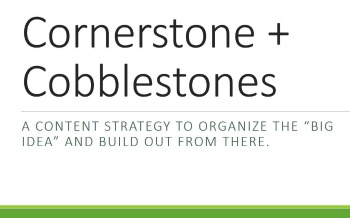I asked participants at a meeting the other day to name their favorite social media platform. Many picked Twitter (news) or Instagram (pretty pictures). There were a few Facebook aficionados (groups), a Pinterest lover (boards), and one Reddit fan (trendspotting).
My question was sparked by a conversation I had with the sales manager at my car dealership. I’m not sure why we started talking about social media, but he told me his favorite platform is Snapchat. Now, I don’t get Snapchat. It’s like an alien alphabet: completely impenetrable. So I asked him why he likes Snapchat and he said, “I like to send funny videos.”
BOOM!
We overcomplicate things.
By now you have probably figured out the point of the group exercise. As individuals, we make simple choices based on what works for us. But as makers, marketers, CFOs, and CEOs, we overanalyze everything. We forget that our customers are (just like) us.
Which brings me to Facebook.
Facebook’s latest algorithm changes were completely predictable.

I know, people are panicking. And, by people, I mean organizations and the people (especially marketers and brand managers) who work for them. There’s been a whole week of articles and blog posts by writers wringing their hands trying to decipher Facebook’s moves and how they will impact page rankings, post likes, and brand visibility. Oh, no, the sky is falling.
Take a deep breath.
The sky may be falling (heck, I’m no astrophysicist), but Facebook is just making its latest course correction.
Facebook is awash in ads and politics (and political ads).
People love Facebook — until they don’t.
Periodically the perceived personal-to-commercial ratio skews too far to the brand side, and then Facebook tweaks its algorithms. It did it, for example, when it dramatically cut back the number of free brand posts in users’ feeds. (Where do you think Facebook’s pay-to-play started?) It’s doing it now, again, with brand pages. This time it’s also trying to filter out political posts (from friends too) unless you interact with political posts. They’re trying to engineer more posts about people and personal life because that’s been the secret sauce that’s kept Facebook users on Facebook.
Instagram has ads too.
At that same meeting, one person told me that she likes Instagram because it has no ads.
Actually, it has a lot. My nephew and I were just looking at them because the ads in his feed are way cooler than the ones I see. (Apparently I need to get active on IG and follow lifehackers and hip brands.)
But her comment is instructive: she doesn’t notice the advertising. No one says that about Facebook.
Here’s one free strategy for your brand to thrive on Facebook.

Focus on your community.
Brands screw up on Facebook because they focus on visibility. So first they scheduled multiple posts a day. When Facebook tweaked its algorithms to minimize the number of company posts a user saw, brands substituted promoted posts for free posts. (And, yes, boosting posts works — but mostly when it’s targeted.) And that approach will always have a role because Facebook wants your dollars.
But why is your business really (really!) on Facebook?
I belong to several private Facebook groups with varying levels of activity. I’m active in two: SoloPR PRO and Daily Burn. One is a professional membership group for independent communications pros; the other is a video-on-demand fitness company with a live-streaming daily workout. Because I pop into each group most days, and often like or comment on posts too, content from community members in those groups often appears in my stream. Some new posts from Daily Burn community members even show up in my notifications.
Those groups — those communities — keep me logging into Facebook.
Facebook’s latest algorithm changes are no reason to panic, as long as your business is focused on people and not just on you.
Screaming boy by Jason Rosewell (Unsplash); Passion by Ian Schneider (Unsplash).



